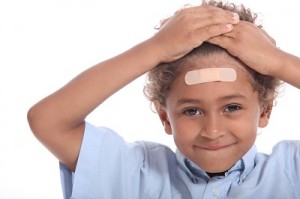What is a Concussion?
By Dr. Ava Hudson, Novant Health Lakeside Family Physicians

It’s not surprising that concussions are the most common head injury in contact sports, but what exactly is a concussion?
Concussions are a type of traumatic brain injury (TBI), which result in a temporary disturbance in brain function. They’re caused by a bump, blow, or hit to the head, causing the brain to rapidly move back and forth inside the skull. This rapid movement can result in chemical changes in the brain and sometimes damage to brain cells.
It is important to know the signs and symptoms of a concussion. Signs and symptoms typically present soon after the injury occurs. A concussion can cause difficulty thinking clearly, headaches, fuzzy or blurred vision, irritability, sleep disturbances, difficulty concentrating, sensitivity to light or noise, nausea, dizziness and more.
In some cases, symptoms may not be noticed for days or weeks after the injury.
In rare cases, a dangerous accumulation of blood may form and push the brain against the skull. Some “danger signs” require immediate medical attention if displayed after a bump, blow or jolt to the head or body:
- Decreased coordination, numbness or weakness
- Headache that worsens or persists
- Repeated vomiting or nausea
- Slurred speech
- An enlarged pupil in one eye
- Look very drowsy or cannot be awakened
- Cannot recognize people or places
- Unusual behavior
- Loss of consciousness
Most children and teens with a concussion feel better within a couple of weeks, but it’s important to note that concussions affect everyone differently. As a result, some may have symptoms that last for months or longer. It’s important to talk to your child’s healthcare provider if their symptoms do not go away or if they worsen once your child returns to his or her regular activities.
If you think your child has a concussion, remove them from sports and activities to prevent more injury. Your child should be seen by a health care provider and should only return to play with permission from a provider experienced in evaluating concussions.
Ask your child’s health care provider for written instructions on helping your child or teen return to school for nurse/teachers and return to play instructions for coach and/or athletic trainer.
Sports are great way for children and teens to stay active and healthy. It is important to talk with your child about concussions and how to prevent them, because prevention is key. Encourage them to report any concussions symptoms to a parent or coach and to always follow the safety rules of their sport.
Dr. Ava Hudson works as a physician at Novant Health Lakeside Family Physicians in Mint Hill, North Carolina. She is an internal medicine and pediatric physician with subspecialty in sports medicine.
This blog was produced in partnership with Charlotte Parent. Click here for the original post and other parenting resources.













